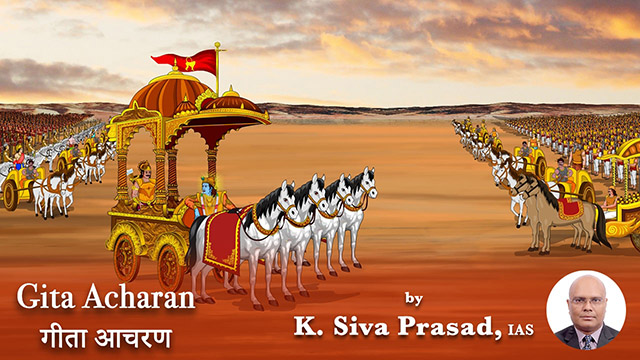
The sixteenth chapter of the Bhagavad Gita is titled ' 𝘿𝙖𝙞𝙫𝙖-𝘼𝙨𝙪𝙧𝙖 𝙎𝙖𝙢𝙥𝙖𝙙 𝙑𝙞𝙗𝙝𝙖𝙜 Yoga '. It is attaining Union through the distinction of the Divine and Demonic Natures. Each one of us represents several possibilities, which can be clubbed as 𝘿𝙖𝙞𝙫𝙖 (divine) and 𝘼𝙨𝙪𝙧𝙖 (demonic). ' 𝘿𝙖𝙞𝙫𝙖 ' is the internal journey towards 𝙋𝙖𝙧𝙖𝙢𝙖𝙩𝙢𝙖 and ' 𝘼𝙨𝙪𝙧𝙖 ' is away from HIM. Krishna mentions ' 𝘼𝙗𝙝𝙖𝙮𝙖𝙢 ' as the first 𝘿𝙖𝙞𝙫𝙖 quality (16.1). Though 𝘼𝙗𝙝𝙖𝙮𝙖𝙢 is interpreted as fearless, it is beyond that.
To understand the Bhagavad Gita, we should always keep in mind the third alternative. It is neither 𝙧𝙖𝙖𝙜 (fondness) nor 𝙫𝙞𝙧𝙖𝙖𝙜 (aversion) but transcending both to be 𝙫𝙚𝙚𝙩-𝙧𝙖𝙖𝙜 which is the third stage. Similarly, it is neither 𝙖𝙖𝙨𝙖𝙠𝙩𝙞 (attachment) nor 𝙫𝙞𝙧𝙖𝙠𝙩𝙞 (detachment) but it is 𝙖𝙣𝙖𝙖𝙨𝙖𝙠𝙩𝙞 . We are quite aware of the polarities of 𝙖𝙖𝙨𝙖𝙠𝙩𝙞/𝙧𝙖𝙖𝙜 or 𝙫𝙞𝙧𝙖𝙠𝙩𝙞/𝙫𝙞𝙧𝙖𝙖𝙜 , but transcending to the third stage is the challenge. Similar is ' 𝘼𝙗𝙝𝙖𝙮𝙖𝙢 ', which is beyond both fear and fearlessness. While fear is an expression of an inner feeling, fearlessness could be suppression of that feeling, however, 𝘼𝙗𝙝𝙖𝙮𝙖𝙢 is beyond both.
Firstly, not getting the desired results leads to fear and anger. 𝘼𝙗𝙝𝙖𝙮𝙖𝙢 is shedding the fruits of action (𝙠𝙖𝙧𝙢𝙖𝙥𝙝𝙖𝙡) to accept any outcome we face as HIS blessings (2.47) while maintaining the inner balance between pleasure-pain; gain-losses; and victory-defeat (2.38).
Secondly, death is our fundamental fear which also includes the death of our beliefs, paradigms, good times and death (loss) of our possessions. 𝘼𝙗𝙝𝙖𝙮𝙖𝙢 is embracing the 'opposite of our beliefs', as they are also a part of HIM. In fact, some cultures encourage the use of death as a tool to attain 𝘼𝙗𝙝𝙖𝙮𝙖𝙢 .
Krishna keeps 𝘼𝙗𝙝𝙖𝙮𝙖𝙢 as the first requirement towards the journey to 𝙋𝙖𝙧𝙖𝙢𝙖𝙩𝙢𝙖 as 𝘼𝙗𝙝𝙖𝙮𝙖𝙢 is essential to dissolve oneself like a salt doll in the ocean; to face HIS fearful 𝙑𝙞𝙨𝙝𝙬𝙖𝙧𝙤𝙤𝙥𝙖𝙢 .

